
HEART
Scope & Guideline
Connecting Researchers to Revolutionize Heart Health
Introduction
Aims and Scopes
- Global Cardiovascular Health:
The journal prioritizes research that addresses cardiovascular health on a global scale, with a particular emphasis on low- and middle-income countries. This includes studies on the prevalence, risk factors, and outcomes of cardiovascular diseases in diverse populations. - Intervention and Treatment Strategies:
HEART publishes studies focused on various intervention strategies for cardiovascular diseases, including pharmacological treatments, lifestyle modifications, and community health initiatives, aiming to improve patient outcomes. - Epidemiological Studies and Risk Assessment:
The journal features epidemiological research that identifies and analyzes risk factors associated with cardiovascular diseases, contributing to the understanding of how different factors influence heart health across populations. - Innovative Methodologies:
Research employing advanced methodologies, such as Bayesian modeling, machine learning, and telemedicine interventions, is a key focus. This includes innovative approaches to data collection and analysis that enhance cardiovascular care. - Policy and Health Systems Research:
HEART emphasizes the importance of health policy research and health system performance, particularly in addressing challenges faced by healthcare systems in managing cardiovascular diseases effectively.
Trending and Emerging
- Multimorbidity and Comorbid Conditions:
There is a growing emphasis on research exploring the interplay of cardiovascular diseases with other chronic conditions, such as diabetes and obesity. This trend highlights the necessity of comprehensive care strategies that address multiple health issues concurrently. - Telemedicine and Digital Health Interventions:
The rise of telemedicine and digital health solutions, particularly in the context of the COVID-19 pandemic, has led to an increased focus on studies evaluating the effectiveness of these technologies in managing cardiovascular health. - Environmental and Socioeconomic Influences:
Emerging research is increasingly examining the impact of environmental factors, such as air pollution, and socioeconomic determinants on cardiovascular health outcomes, reflecting a holistic approach to understanding heart disease. - Personalized Medicine and Genomics:
There is a notable increase in studies exploring the role of genetics and personalized medicine in cardiovascular disease prevention and treatment, indicating a shift towards tailored therapeutic strategies. - Public Health and Policy Frameworks:
Research focusing on public health initiatives and policy frameworks aimed at improving cardiovascular health on a population level is gaining traction, underscoring the importance of systemic changes in healthcare delivery.
Declining or Waning
- Traditional Risk Factors:
Research centered on traditional cardiovascular risk factors, such as hypertension and hyperlipidemia, is becoming less frequent. This may indicate a shift towards exploring more complex interactions and emerging risk factors in cardiovascular health. - Single-Disease Focus:
There is a noticeable decline in studies focusing solely on individual cardiovascular diseases. The trend is moving toward a more integrated approach that considers multimorbidity and the intersection of various health conditions. - Local Case Studies:
While local case studies have been valuable, there is a decreasing trend in publications that focus exclusively on specific regional issues without broader implications. The journal is increasingly favoring studies with global relevance.
Similar Journals

Cardiology Journal
Exploring the future of cardiac science.Cardiology Journal, published by VIA MEDICA, stands as a prominent resource in the field of cardiology and cardiovascular medicine, with an ISSN of 1897-5593 and an E-ISSN of 1898-018X. Recognized for its Open Access model established since 1994, this journal facilitates widespread dissemination of critical research findings, allowing practitioners and researchers globally to access valuable insights without barriers. Based in Poland, with an address at UL SWIETOKRZYSKA 73, 80-180 GDANSK, it has achieved a respectable Q2 classification in 2023 for both Cardiology and Miscellaneous Medicine categories, reflecting its influence and quality within the scholarly community. With a Scopus ranking placing it at #117 out of 387 in Cardiology, it lies within the 69th percentile, underpinning its commitment to advancing knowledge in cardiovascular health. The journal’s converged years extending from 2006 to 2024 ensure it captures ongoing developments in a rapidly evolving field. As such, the Cardiology Journal serves as an indispensable platform for researchers, professionals, and students dedicated to exploring the frontiers of cardiac science and improving patient care.

Netherlands Heart Journal
Bridging Research and Practice in the World of Cardiovascular MedicineNetherlands Heart Journal is a premier academic publication dedicated to advancing knowledge in the field of cardiology and cardiovascular medicine. Published by BOHN STAFLEU VAN LOGHUM BV, this journal has established itself as a critical platform for researchers, professionals, and students seeking to explore groundbreaking findings and innovative practices in cardiovascular health. With an ISSN of 1568-5888 and E-ISSN 1876-6250, the journal boasts a respectable Q2 ranking in the Cardiology and Cardiovascular Medicine category, placing it in the top half of its field according to the 2023 quartiles. The Scopus ranking places it 130th out of 387 in the relevant category, indicating a commendable percentile rank of 66th, which attests to its influence and quality of published research. Spanning from 2005 to 2024, the journal endeavors to include a diverse array of topics, encompassing clinical practice, technological innovations, and public health considerations related to cardiovascular diseases. Researchers and practitioners are encouraged to engage with the journal's robust content, contributing to and benefiting from the collaborative effort to enhance cardiovascular health worldwide.

Arquivos Brasileiros de Cardiologia
Pioneering open-access research in cardiovascular medicine.Arquivos Brasileiros de Cardiologia is a leading open-access journal dedicated to advancing the field of cardiology and cardiovascular medicine. Established in 1950 and published by the ARQUIVOS BRASILEIROS CARDIOLOGIA, this Brazilian journal plays a crucial role in disseminating high-quality research that addresses both emerging and established topics in cardiovascular science. With an impressive history and a commitment to open access since 1997, it provides researchers, healthcare professionals, and students with free and readily available content that significantly contributes to the understanding and management of cardiovascular diseases. The journal is indexed in Scopus and holds a Q3 ranking in the category of Cardiology and Cardiovascular Medicine, demonstrating its relevance and participation within the global research community. Researchers can submit their work and access a wealth of information that spans a variety of subfields, reflecting the journal’s dedication to fostering innovation and collaboration within cardiology. With a mailing address at Avenida Marechal Câmara, 160-330 Centro, Rio de Janeiro, RJ 20,020-907, Brazil, the journal continues to serve as a vital platform for scholarly communication and knowledge exchange in the cardiovascular realm.
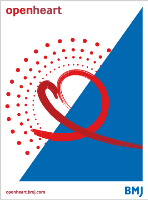
Open Heart
Advancing Cardiovascular Knowledge for AllOpen Heart is a prestigious, peer-reviewed open access journal published by BMJ Publishing Group, focusing on the dynamic field of Cardiology and Cardiovascular Medicine. Launched in 2013, the journal has rapidly ascended to prominence, achieving a Q1 quartile ranking in its category as of 2023, reflecting its high-quality scholarly contributions. With an active publishing history from 2014 through 2024, Open Heart offers an expansive platform for researchers, clinicians, and students to disseminate and access groundbreaking research findings, reviews, and case studies that address critical issues in cardiovascular health. The journal is indexed in Scopus, ranking 133rd out of 387 in the Medicine - Cardiology and Cardiovascular Medicine category, placing it within the 65th percentile of its peers. Based in the United Kingdom, it promotes global research and collaboration in the cardiovascular domain, ensuring open access to vital knowledge for all stakeholders in the medical community. For access options and more information, visit the Open Heart website.
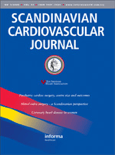
SCANDINAVIAN CARDIOVASCULAR JOURNAL
Elevating standards in cardiovascular healthcare and research.The Scandinavian Cardiovascular Journal, published by Taylor & Francis Ltd, is a distinguished peer-reviewed journal aimed at advancing the field of cardiology and cardiovascular medicine. With an impressive history dating back to 1967 and a forward-looking perspective until 2024, it has consistently contributed valuable research and insights, making it essential reading for anyone involved in cardiovascular healthcare. The journal holds a strong position in the academic community, reflected in its Q2 rating in both Cardiology and Cardiovascular Medicine, and a similar classification in the broader field of Medicine as of 2023. It is indexed in multiple databases, with a Scopus rank of #178 out of 387 in its category, placing it in the 54th percentile. The journal provides open access options, promoting wider dissemination of knowledge while supporting both researchers and practitioners dedicated to improving cardiovascular health. Its focus on high-quality, impactful research makes it an invaluable resource for professionals and students alike, keen to stay at the forefront of cardiology advancements.
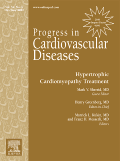
PROGRESS IN CARDIOVASCULAR DISEASES
Pioneering Research for a Healthier HeartPROGRESS IN CARDIOVASCULAR DISEASES is a leading journal in the field of cardiology and cardiovascular medicine, published by W B SAUNDERS CO-ELSEVIER INC. With an impressive impact factor that places it in the esteemed Q1 quartile of its category, this journal ranks among the top 32 out of 387 journals in its field, positioning itself in the 91st percentile. Since its inception in 1958 and continuing until 2024, it has been a prolific source of cutting-edge research, reviews, and clinical insights that contribute significantly to the understanding and treatment of cardiovascular diseases. Although it does not currently offer open access options, the journal's rigorous peer-review process ensures that all published content meets the highest standards of scientific excellence. As a key resource for researchers, practitioners, and students alike, PROGRESS IN CARDIOVASCULAR DISEASES serves as an indispensable tool for advancing knowledge and practice in cardiovascular health.
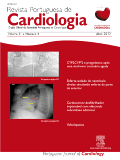
Revista Portuguesa de Cardiologia
Empowering the fight against heart disease through open access research.Revista Portuguesa de Cardiologia, published by Elsevier España SLU, stands as a pivotal resource in the realm of Cardiology and Cardiovascular Medicine. With its origins tracing back to 1970, this journal has cultivated a robust academic presence, achieving a 2023 Q3 ranking in its category, and currently holding a position of #220 out of 387 on the Scopus rankings, placing it within the 43rd percentile of its field. This open access journal, available since 2011, aims to disseminate high-quality research and insights relevant to contemporary cardiovascular issues. Its commitment to accessibility and knowledge exchange enhances its importance for clinicians, researchers, and students alike, fostering a more informed community in the fight against cardiovascular diseases. Operating from its base in Barcelona, Spain, the journal welcomes contributions that further the understanding and treatment of heart conditions, contributing significantly to the advancement of cardiovascular health.

International Cardiovascular Research Journal
Connecting global experts in cardiovascular research.International Cardiovascular Research Journal, published by Shiraz University Medical Sciences, serves as a vital platform for the dissemination of cutting-edge research in the field of cardiology and cardiovascular medicine. Since its inception in 2011, this journal has continuously devoted itself to promoting the highest quality of scholarly communication, helping to bridge the gap between laboratory findings and clinical application. With an ISSN of 2251-9130 and an E-ISSN of 2251-9149, it is indexed in prominent databases, contributing to its visibility and accessibility to a global audience. Although currently classified in the Q4 quartile in the 2023 rankings, the journal is committed to enhancing its impact factor and academic stature. It aims to facilitate open access for all published articles, although specific details on access options are pending. Through its rigorous peer-review process and diverse scope—which encapsulates advancements, clinical studies, and innovative therapeutic strategies—this journal fosters academic collaboration in the realm of cardiovascular health, making it an invaluable resource for researchers, practitioners, and students alike.
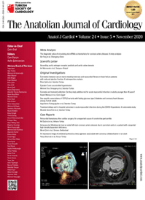
Anatolian Journal of Cardiology
Connecting Global Hearts with Cutting-edge Cardiovascular Knowledge.The Anatolian Journal of Cardiology, published by KARE PUBL, stands as a vital resource in the field of Cardiology and Cardiovascular Medicine. With an ISSN of 2149-2263 and E-ISSN 2149-2271, this Open Access journal has been fostering the dissemination of critical research since 2001, ensuring that high-quality content is freely available to a global audience. Based in Turkey, the journal aims to bridge gaps in cardiological knowledge through rigorous peer-reviewed articles that span a wide range of topics, from innovative clinical practices to groundbreaking research findings. While its current ranking places it in the Q3 category of cardiology journals, the Anatolian Journal of Cardiology continues to strive towards enhancing its impact, currently holding a Scopus rank of 236 out of 387. Researchers, practitioners, and students alike will find this journal an essential platform for keeping abreast of the latest developments in cardiovascular health.
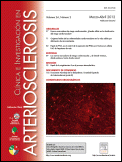
Clinica e Investigacion en Arteriosclerosis
Fostering collaboration in cardiology and pharmacology advancements.Clinica e Investigacion en Arteriosclerosis is a premier academic journal dedicated to the field of cardiology and cardiovascular medicine, published by ELSEVIER. With its ISSN 0214-9168 and E-ISSN 1578-1879, the journal aims to disseminate high-quality research and innovations in the understanding and treatment of arterial diseases, contributing significantly to both clinical practices and pharmacological advancements. Established in 2007 and continuing into 2024, the journal has garnered recognition with a notable Q3 categorization in both Cardiology and Cardiovascular Medicine and Pharmacology (medical) for 2023, reflecting its impact in the academic community. Researchers and healthcare professionals utilizing this journal will find a diverse range of articles exploring novel therapeutic strategies and epidemiological data, making it an essential resource for advancing knowledge and practice in cardiovascular health. While it does not operate as an open-access journal, the findings published in Clinica e Investigacion en Arteriosclerosis are pivotal for understanding current trends and future directions in cardiovascular research.